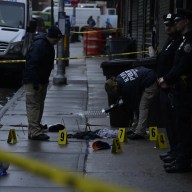By Ayala Ben-Yehuda
The proposed legislation would impose stricter parking requirements on houses of worship and reduce the number of low-density residential neighborhoods into which medical offices can move, among other provisions.
But Sean Walsh, president of the Queens Civic Congress, said Monday the new plan to restrict the growth of houses of worship and medical offices in residential neighborhoods is “far worse than what we have.”
“Hopefully, we can impress upon this mayor and this City Council that this is far too little,” said Walsh, who heads the umbrella organization of about 100 civic groups in Queens. “There are some serious problems with this text as it stands.”
Last summer the City Council's Land Use Committee passed a joint proposal with the Department of City Planning to make changes to the city's 1961 zoning resolution – which gives wide latitude to community facilities' locating in residential areas.
The legislation, spearheaded in the Council by Tony Avella (D-Bayside), chairman of the Zoning and Franchises Subcommittee, aims to address residents' anger over the strain on parking, other city services and quality of life caused by the facilities' unrestricted growth.
After community board review, the proposal will go to the five borough presidents, then to the City Planning Commission and the City Council.
Avella, who has campaigned on his zoning reform efforts, said “you can't attack the whole issue at once. This is the furthest we've ever gotten in 40 years.”
Under the proposal, parking requirements for houses of worship in low-density residential areas would be based on building capacity, a change from the current formula that bases parking spaces on the number of fixed seats in the building. Religious institutions have skirted the fixed-seat formula by using folding chairs.
Walsh, who is addressing community boards and civic groups around the city on the proposal, said “where there is a seating requirement, they can get a variance. Every facility that wants to get a variance gets one.”
The civic leader was concerned that occupancy would not be based on the number of people a house of worship could hold but rather the capacity of the building's largest room. He also said the new requirement of one parking space for every 10 people at a house of worship is not stringent enough.
New outpatient medical offices and clinics will no longer be allowed in the lowest-density residential areas under the proposal. But Walsh took issue with the provision that would allow medical offices up to 10,000 square feet with a Board of Standards and Appeals variance in residential areas with higher density.
Avella said it was not possible to write a law barring variances completely but he was “very concerned” about the 10,000-square-foot allowance.
“We need to get this under our belts before we can go on to the next step,” Avella said. “If they see a lot of opposition for no good reason they'll simply walk away from the proposal and (we'll) have nothing.”
“It may not be what everybody wants, but it is a step forward,” Avella said.
The Queens Civic Congress has also expressed concern that the legislation does not address community facilities' bulk or their commercial for-profit uses.
Community Board 13 Chairman and Queens Civic Congress leader Richard Hellenbrecht said, “I don't think we can possibly do this now and then come back six months or a year from now and (review) another part of this.”
Hellenbrecht said his community board, which covers the Queens Village and Bellerose areas, had not yet discussed the proposal in depth but the 10,000-square-foot medical office allowance “would really devastate many parts of our neighborhood.”
Hellenbrecht said he would probably not support the legislation in its current form, but “I would represent the (community) board in whatever it decides to do.”
“I would really hope this effort on our part would make people sit down at the table and negotiate a little farther.”
Reach reporter Ayala Ben-Yehuda by e-mail at news@timesledger.com or call 718-229-0300, Ext. 146.
































